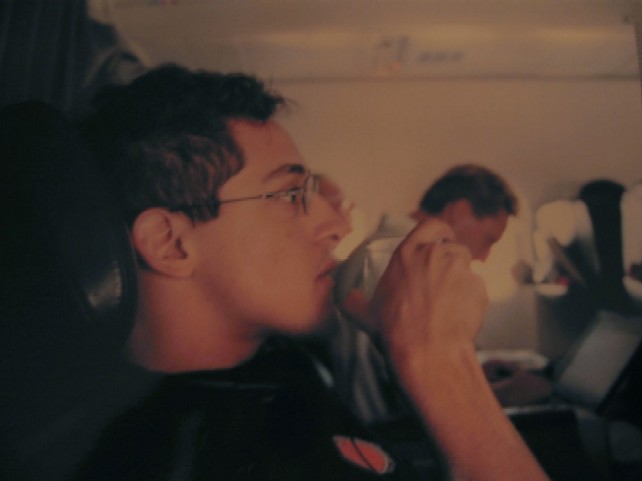Life CAN begin before noon
Let's keep adding strokes to my self-portrait as cranky snob, although I'm sure I'm not anywhere near alone on this one: going to the movies blows. Is it the prices? Is it the endless ads before the movie? Is it the perplexing lack of consideration on the part of your fellow moviegoer? Is it the actual films themselves?
Yes.
I've managed to find a way to alleviate at least a couple of those irritants. The Muvico Starlight 20 on Bruce B. Downs (I think all Muvicos as well) has pre-matinee showings starting at 10 AM on Saturdays, a dollar less even than student pricing. It's admittedly strange to be in a movie theatre when a lot of people haven't even woken up yet. But as long as you steer clear of the kiddie stuff (matinees are magnets for the rugrats), you'll be treated to a much more pleasant film experience, sharing the hall with just a few jaded individuals like myself and others who remember the days when people were just more polite. Was that too condescending a way to say old people?
My pre-matinee movie today was A History of Violence, which has been receiving some pretty high praise. Count me impressed.
I think I would actually like to see this movie in a packed theatre, perhaps both here and in the director's native Canada. I have a pretty distinct idea that the reactions to the film would be different. The title insinuates much more than the plot twist it foreshadows. David Cronenberg, who first made his name known in film by making a human head explode, is obviously speaking to a violent culture, possibly one not his own by birth (perhaps I'm being a bit prejudice, but I can't say that I know Canadian film for its visceral action). In the hands of anyone less adept, the film could have been a grandstanding morality tale or a mindless revenge tale. But try to find a message here and you will be left with disappointed contradiction. Cronenberg is much too smart for preaching, so he appeals to our proven desire for a bit of the old ultra-violence (it's probably no coincidence that he made a point to make this his most commercial movie since The Fly, even casting what passes for today's action start in Viggo Mortensen) and then dares us to point fingers. Cronenberg still manages to make subtle use of his knack for well-orchestrated mayhem and gooey gore, but the effect might be even more unsettling than any horror movie he could ever make (I haven't seen Crash, his other attempt at relatively human horror).
You could criticize Violence for being misanthropic, particularly in its baiting of the audience, making the sinister appealing by giving us two interesting, downright fun villains in Ed Harris and William Hurt.
You can see the movie fan in Cronenberg when watching this movie. There is a definite Western feel to much of its set pieces. The mob makes an appearance, and that plus the theme of family vs. famiglia demonstrate the still far-reaching influence of The Godfather. But the two films that came to mind the most while watching were A Simple Plan, Sam Raimi's own foray into more human issues than his usual slasher slapstick, and The Road to Perdition, another film about what violence does to family bonds (as well as also being based on a graphic novel). Thinking of that film is when Violence truly proves to be succcessful. Perdition was a movie made out of obvious talent, and yet the human element it tried so very hard to represent (why else cast Tom Hanks and Paul Newman?) often got lost behind the visual flair. As much fun as Cronenberg has making those action scenes, he balances the tone of the film perfectly by creating a family unit he obviously truly cares about. It is ultimately the scenes involving Mortensen's family that carry much more force than the neverthless shocking gunplay. He gives us characters with depth, but never sells out that depth for the sake of the violence. Instead the family is always the center of the film, the violence merely the intruder that nearly destroys it. Unlike the mindless body counts of so much of the summer fare we've been subjected to the last few months, every death that takes place on screen actually means something. But it's the aftermath of said deaths that stays with you long after the credits roll.
Posted by Joel at 10/08/2005 02:13:00 PM
![]()






« Home